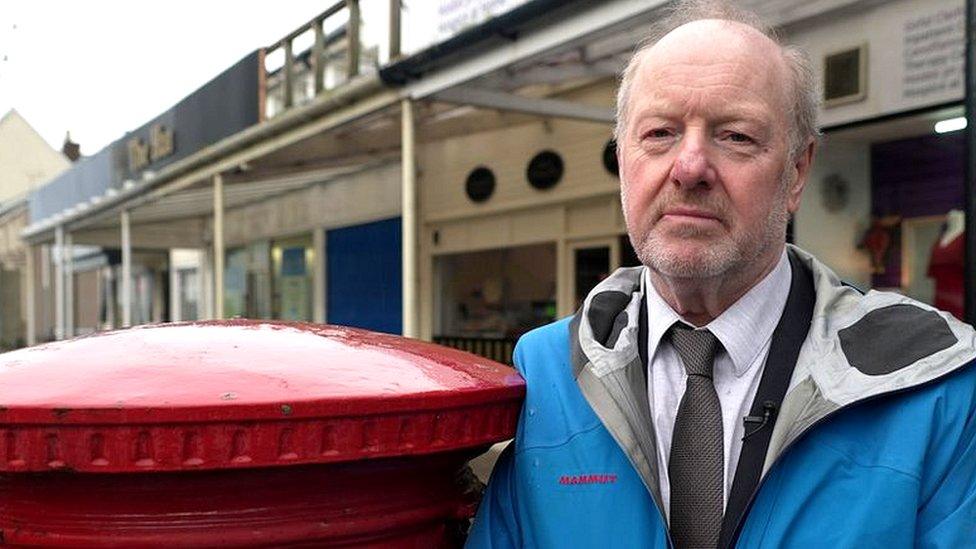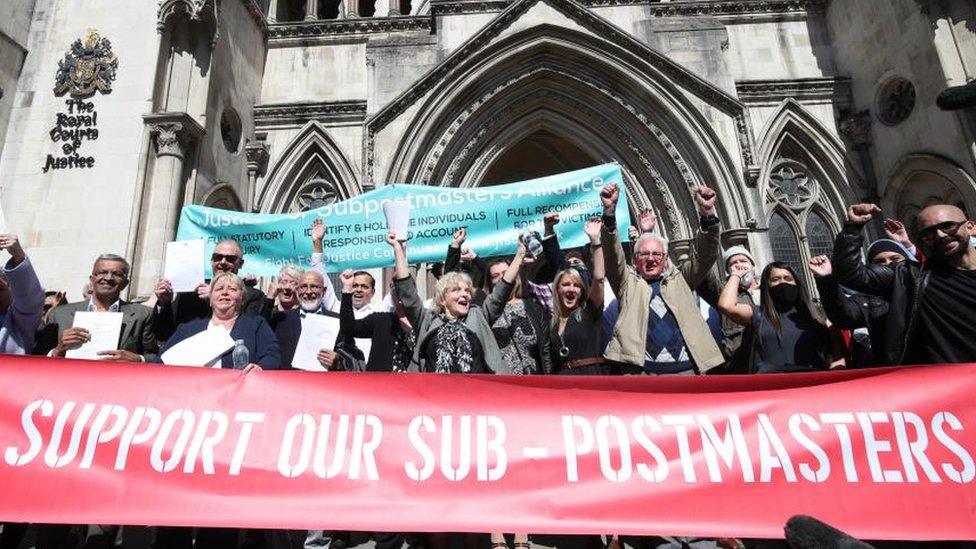Post Office lied and threatened BBC over Horizon whistleblower
- Published
Whistleblower Richard Roll told Panorama in 2015 that postmasters' accounts could be secretly altered
The Post Office threatened and lied to the BBC in a failed effort to suppress key evidence that helped clear postmasters in the Horizon scandal.
Senior managers tried to smear postmasters before Panorama broadcast an interview in 2015 with a Fujitsu whistleblower.
Former insider Richard Roll revealed accounts on the Horizon computer system could be secretly altered.
The Post Office declined to comment while the public inquiry is ongoing.
Mr Roll would go on to play a crucial part in a 2019 High Court case which ruled that bugs could cause errors in the Post Office computer system intended to keep track of transactions in local branches.
Between 1999 and 2015, 700 sub-postmasters and postmistresses - self-employed people who run Post Office branches - were prosecuted for offences such as theft, fraud and false accounting, with some going to prison and others even taking their own lives.
The BBC can reveal that in the period leading up to the broadcast of Trouble at the Post Office, the 2015 Panorama programme featuring the whistleblower testimony:
Experts interviewed by the BBC were sent intimidating letters by Post Office lawyers about their participation in the programme
Senior Post Office managers briefed the BBC that neither their staff nor Fujitsu - the company which built and maintained the Horizon system - could remotely access sub-postmasters' accounts, even though Post Office directors had been warned four years earlier that such remote access was possible
Lawyers for the Post Office sent letters threatening to sue Panorama and the company's public relations boss Mark Davies escalated complaints to ever more senior BBC managers
The Post Office's false claims did not stop the programme, but they did cause the BBC to delay the broadcast by several weeks.
Documents submitted to the ongoing public inquiry reveal how that small victory was celebrated by Post Office senior management. Then-chief executive Paula Vennells congratulated Mark Davies and his PR team on their "extensive work".
This was just the latest in a long line of lobbying, misinformation and outright lies that had faced a small number of BBC journalists trying to uncover the truth about the Post Office scandal.
It began in 2011, when then-BBC regional reporter Nick Wallis first interviewed Jo Hamilton, played by Monica Dolan in the ITV drama Mr Bates v The Post Office. She told him how the Horizon computer system had made money seem to vanish from the tills at her branch in Hampshire.
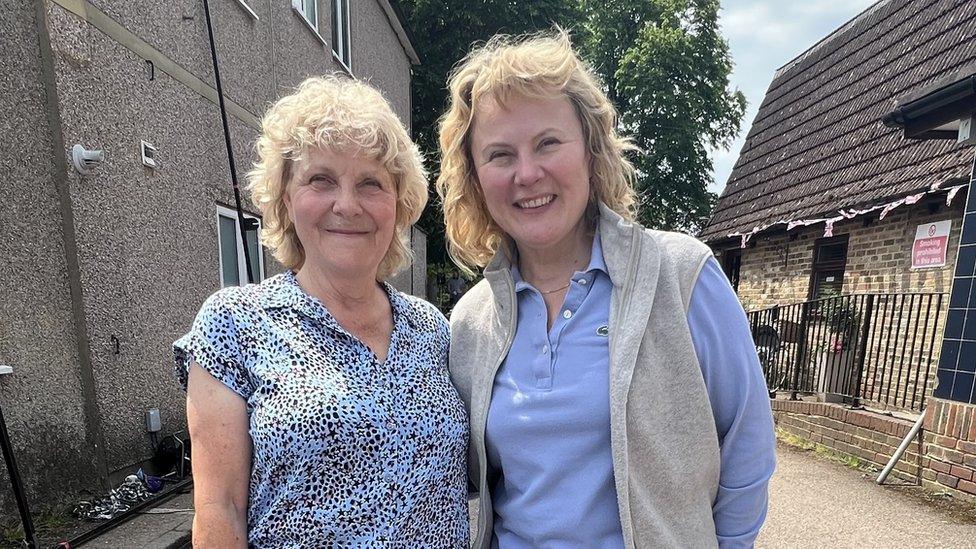
Sub-postmistress Jo Hamilton - left, pictured with actress Monica Dolan from the ITV drama - spoke to the BBC in 2011
The Post Office said there was "no evidence pointing to any fault in the technology".
By 2014, Nick Wallis and producer Tim Robinson were investigating new claims - for BBC regional investigative programme Inside Out - that staff at Fujitsu were able to remotely tamper with Horizon accounts.
They interviewed sub-postmaster Michael Rudkin, played by Shaun Dooley in the TV drama, who said he had seen Fujitsu staff tampering with accounts on a visit to the company's head office
The Post Office told the BBC journalists at the time there was "no functionality in Horizon for either a branch, Post Office or Fujitsu to edit, manipulate or remove transaction data" and that it had found "no evidence" to suggest that convictions were unsafe.
We now know that 18 months before this statement, a barrister had warned senior Post Office managers a number of prosecutions might be unsafe because of bugs in the system that had not been disclosed in court cases against the sub-postmasters.
Rather than admit the truth, the Post Office continued to spread misinformation.
And minutes of a Post Office meeting later uncovered in court show its PR boss Mark Davies directly lobbied senior BBC management to try to stop further negative coverage of the story.
"While we are able to withstand this current level of interest, it is resource intensive. We have made representations to the director of BBC News and Current Affairs," Mr Davies told colleagues.
The Post Office cover-up was holding, but Alan Bates - the hero of the ITV drama - had another card to play.
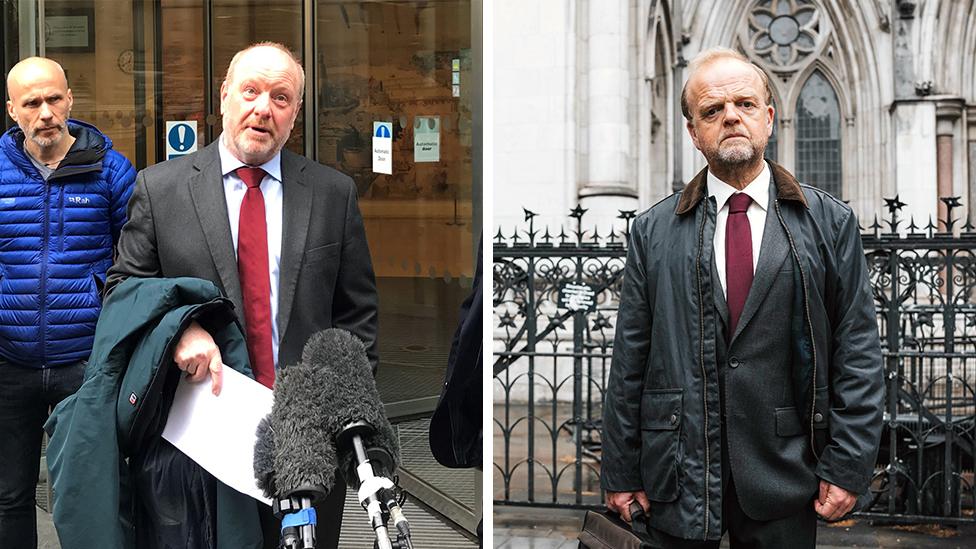
Alan Bates - played by Toby Jones in the ITV drama - introduced Panorama to the whistleblower
At a meeting in a garden centre tea room in Shrewsbury, he told Nick Wallis he had been contacted by a whistleblower from Fujitsu - who knew the truth about Horizon and remote access.
That man was Richard Roll, who had worked for Fujitsu on the Post Office's Horizon computer system in the early 2000s.
Mr Bates wanted Panorama to take on the story, so Nick introduced the whistleblower to the programme team.
For the 2015 programme, he told Panorama reporter John Sweeney on camera how a team of Fujitsu staff had remote access to branch accounts and could make changes to them without the sub-postmasters' knowledge.
It was explosive testimony that could call into question the convictions of more than 700 sub-postmasters prosecuted on the basis of Horizon evidence, as the denial of the possibility of remote access underpinned the Post Office's legal position.
The Post Office was going to fight hard to stop the story from coming out - its misinformation campaign ramped up a gear.
'Enormous regret'
Panorama journalists Matt Bardo and Tim Robinson were invited to Post Office HQ for an on-the-record briefing about the Horizon system.
Network manager Angela van den Bogerd joined PR boss Mark Davies and another senior manager, Patrick Bourke.
Ms van den Bogerd insisted nobody could change the sub-postmasters' accounts without their knowledge.
She said any alterations "would leave a footprint. And that's the important bit."
Matt Bardo asked: "So in sum, it is not now and never has been possible for anybody from Post Office or Fujitsu to interfere with transactions, without the clear knowledge of the sub-postmaster?"
Mr Bourke said: "It is 100% true to say we can't change, alter, modify, existing transaction data, so the integrity is 100% preserved."
"And that's true now and has been for the duration of the system?" Mr Bardo asked. "Yeah," said Ms van den Bogerd.
That wasn't true. Not then, and not for the duration of the system.
Since then, the Post Office has been forced to accept that Fujitsu staff could access and change accounts without the sub-postmasters' knowledge.
One of the Post Office's lawyers suggested in 2019 that Angela van den Bogerd and her colleagues had denied remote access was possible because they did not know at the time. He told the High Court: "It is a matter of enormous regret that the senior managers who dealt with Panorama were not aware that remote access to Horizon was possible."
But documents Panorama obtained for a follow-up programme in 2020 show the Post Office had known it was possible for years.
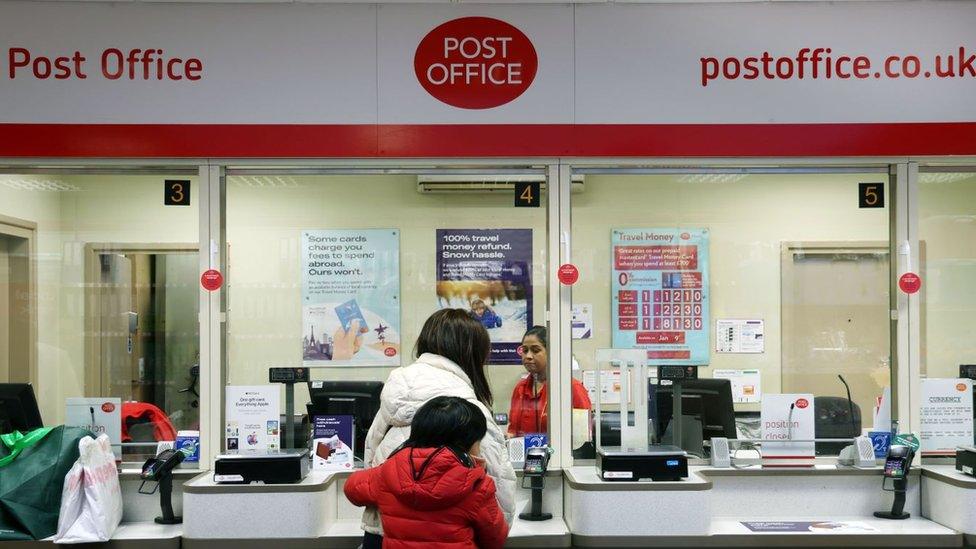
The Horizon computer system was intended to track transactions in Post Offices, but sub-postmasters complained of mysterious shortfalls
A report by consultants Ernst and Young sent to Post Office directors in 2011 warned that Fujitsu staff had "unrestricted access" to sub-postmasters' accounts, that "may lead to the processing of unauthorised or erroneous transactions".
The misleading on-the-record briefing was just the first step in the Post Office's onslaught to frustrate the 2015 Panorama investigation.
When it learned the names of experts Panorama was interviewing, lawyers and senior managers sent them intimidating letters.
Ian Henderson, from the independent forensic accountants Second Sight, had uncovered other evidence of miscarriages of justice at the Post Office. He was warned he did not have the legal expertise to comment on prosecutions and the Post Office threatened to sue him.
"If your statements go as far as to harm Post Office's reputation then we may have to take even more serious action in order to protect our brand," he was told. "For the avoidance of doubt, Post Office does not condone you speaking to Panorama and all our legal rights are fully reserved."
To protect the whistleblower from similar correspondence, the Panorama team did not tell the Post Office Richard Roll's name. Instead, the journalists said they had spoken to a Fujitsu insider, and outlined the allegations he was making.
Smears and false claims
From the Post Office's response, it was clear that the whistleblower's evidence which would be featured in the film was of particular concern.
PR boss Mark Davies fired off complaints to ever more senior managers at the BBC, and expensive external lawyers were hired with public money to send letters threatening to sue Panorama.
The programme team received hundreds of pages of correspondence and reports from the Post Office and their lawyers - but none of the paperwork admitted remote access was possible.
At the time, Mr Davies told Panorama "there is overwhelming evidence that the losses complained of were caused by user actions, including deliberate dishonest conduct".
The Post Office's lobbying did secure them a further meeting, this time an off-the-record briefing with the programme's then-editor. Such meetings are viewed with suspicion by many investigative journalists as they can be used as a tactic to hamper inquiries and publication.
So it proved in this case. The Post Office took the opportunity to smear some of the sub-postmasters Panorama was planning to feature in its programme, hinting at potential motives to steal from the tills.
In one case, it falsely claimed it had documents showing a postmaster was guilty of theft. But it said it would only show them to the programme team if they promised not to share them with anyone else - which meant Panorama would not even be able to discuss them with the postmaster who had been accused.
Panorama refused. The team reviewed all the available evidence, which delayed the broadcast. But nothing was found that cast doubt on the sub-postmasters' stories and the film aired in August 2015.
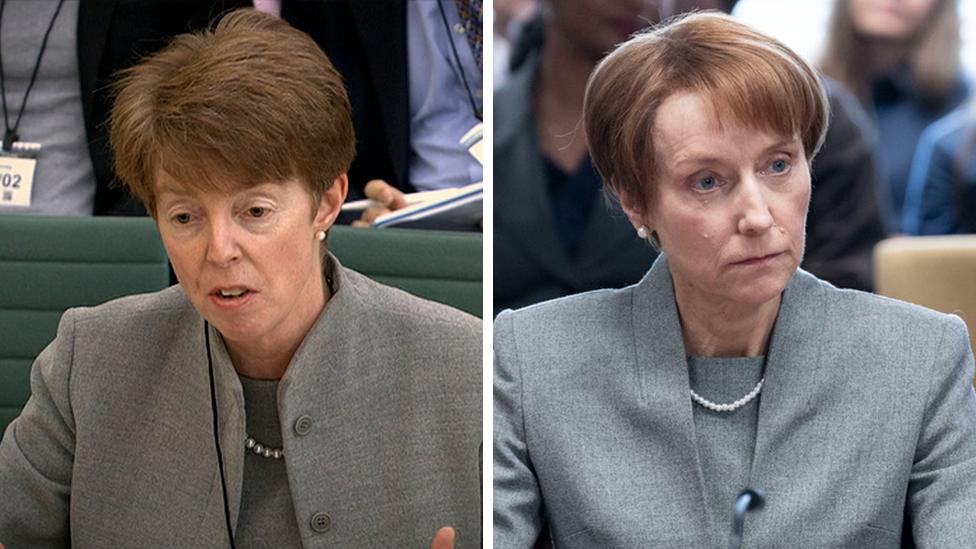
Paula Vennells - left, with actress Lia Williams playing her, right - now says she is "truly sorry" people were wrongly accused
It can often be a struggle to get a Panorama to air. It's not unusual for big companies and wealthy individuals to mount intensive legal and lobbying efforts to protect their reputations. But for the programme team, this was a battle like few others - and it was a government-owned institution that was waging the war.
The Post Office had failed to stop Richard Roll's story being told, but it still sought to reduce its impact.
After the programme aired, the Post Office immediately published a statement on its website that said it would be complaining to the BBC about the "unsubstantiated allegations that continue to be made".
Richard Roll's allegations were not picked up by the rest of the media and his testimony did not spark the national outrage that has followed ITV's drama.
Post Office CEO Paula Vennells reported back to the government body which owns the Post Office that "the programme contained no new information and received almost no pick-up from other media". Mrs Vennells made no mention of the new information provided by the whistleblower.
But all was not lost.

Panorama from 2015 - Trouble at the Post Office
The Post Office has prosecuted dozens of postmasters after their computers showed that money had gone missing. Reporter John Sweeney meets a whistleblower who says there were problems with the computer system. And he investigates claims that the Post Office charged some postmasters with theft even when the evidence didn't stack up.

The programme had an impact on one important viewer, which would prove to be a pivotal moment in the story.
Lawyer Patrick Green KC immediately realised the significance of Richard Roll's testimony.
The barrister went on to lead the postmasters' legal case that showed Horizon could be to blame for unexpected shortfalls.
Panorama's whistleblower appeared as a witness at the High Court in March 2019 and his account played a key part in discrediting the Post Office's insistence that remote access to the branch accounts was not possible.
Mr Green later told Panorama how important the 2015 programme had been to their victory.
He said: "I'm not sure that this litigation would've happened as it did had Panorama not made that programme."
The postmasters' victory over the Post Office at the High Court was the turning of the legal tide and led to the overturning of convictions at the Court of Appeal.
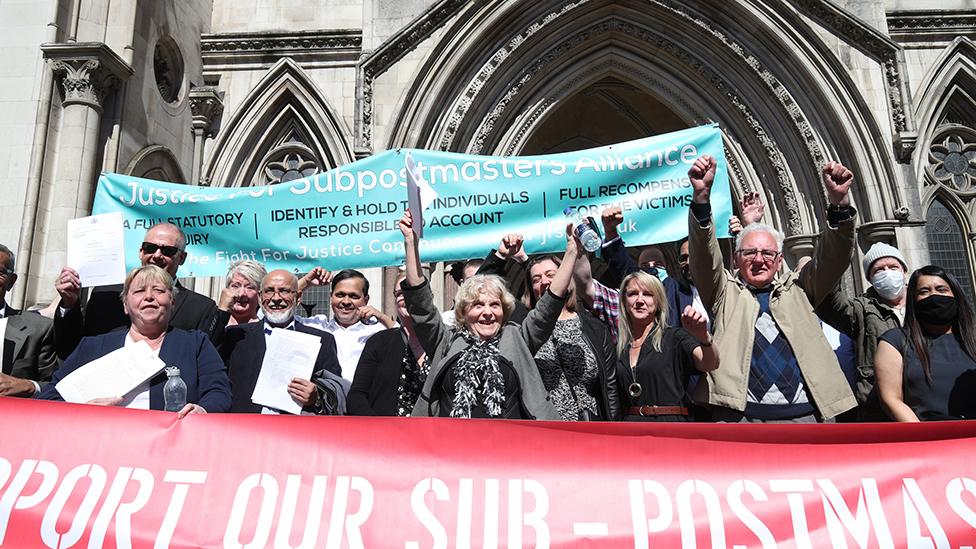
Dozens of former sub-postmasters had their convictions later quashed after the High Court victory
Lawyers for Mark Davies told Panorama he had acted at all times entirely in good faith and that his statements had been based on the information he was given at the time.
"Our client was doing his job… to ensure that any coverage of this matter was fair and accurate," they said.
And Paula Vennells now says: "I am truly sorry for the devastation caused to the sub-postmasters and their families, whose lives were torn apart by being wrongly accused and wrongly prosecuted as a result of the Horizon system."
But for years, the Post Office tried to suppress crucial evidence.
The Post Office knew in 2015 that there were bugs and errors in Horizon. It knew that remote access was possible. And it knew some of its convictions were unsafe.
The evidence in Panorama's 2015 film was there for the government to see too.
But it took several trials, more than 90 overturned convictions and a TV drama for the Post Office scandal to get the attention it has long deserved.

Have you been personally affected by the Post Office scandal? Share your experiences by emailing haveyoursay@bbc.co.uk, external.
Please include a contact number if you are willing to speak to a BBC journalist. You can also get in touch in the following ways:
WhatsApp: +44 7756 165803
Tweet: @BBC_HaveYourSay, external
Please read our terms & conditions and privacy policy
If you are reading this page and can't see the form you will need to visit the mobile version of the BBC website to submit your question or comment or you can email us at HaveYourSay@bbc.co.uk, external. Please include your name, age and location with any submission.
Related topics
- Published11 January 2024
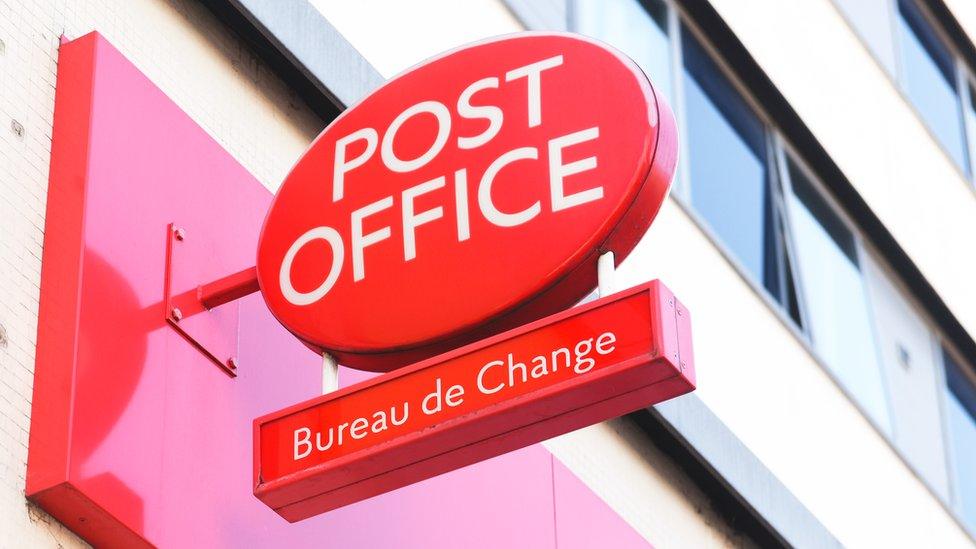
- Published10 January 2024
